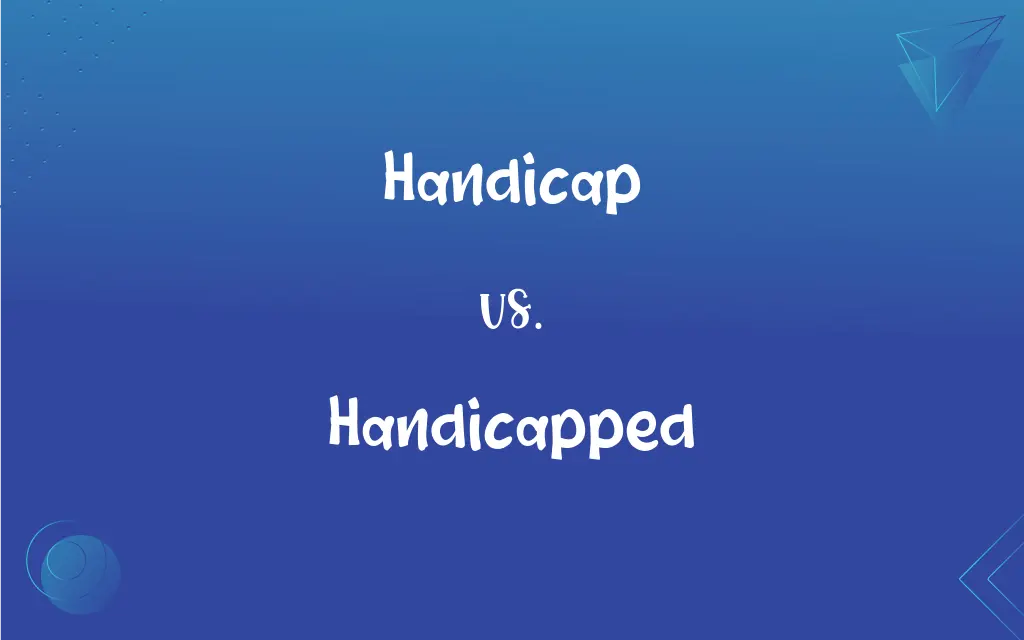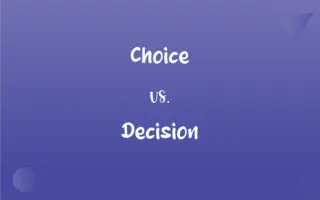Handicap vs. Handicapped: What's the Difference?
Edited by Aimie Carlson || By Janet White || Published on November 1, 2023
"Handicap" is a circumstance that makes progress or success difficult, while "handicapped" refers to a person who has a disability that significantly restricts function.

Key Differences
"Handicap" is a term that can refer to a situation or condition that makes it more difficult for someone to do something, while "handicapped" is an adjective used to describe a person who has a physical or mental disability. For instance, a "handicap" in golf means a player's skill level, which affects their score, whereas a "handicapped" person might have difficulty with certain activities due to their disability.
The word "handicap" can also mean an advantage or restriction placed on someone or something in order to equalize chances. For example, in horse racing, a stronger horse might be given a weight "handicap" to slow it down. In contrast, "handicapped" parking spaces are reserved for individuals with disabilities to provide closer access to a building.
In sports, a "handicap" allows players of different skill levels to compete against each other on more equal terms. However, being "handicapped," in a general sense, refers to having some type of disability or impairment, either physical or mental, that affects one's ability to perform certain tasks.
When discussing challenges or disadvantages in a broader context, "handicap" can be used. For instance, a company might face a "handicap" due to market conditions. However, the term "handicapped" is specifically used in reference to individuals with disabilities, and it's important to note that language around disabilities has evolved, with a preference for person-first language: "person with a disability" instead of "handicapped."
The concept of a "handicap" exists in various fields and refers to any factor that causes a marked disadvantage. Conversely, "handicapped" is a term that has historically been used to describe individuals with disabilities but is now seen as outdated and sometimes offensive, with preferences moving toward more respectful terminology.
ADVERTISEMENT
Comparison Chart
Grammatical Category
Noun
Adjective (sometimes noun)
Meaning
A disadvantage or challenging condition
Having a disability
Usage Context
Broad (sports, business, etc.)
Specifically refers to individuals with disabilities
Modern Acceptance
Still widely used
Becoming outdated; can be viewed as insensitive
Preferred Term
Remains the same
"Person with a disability" or "disabled person"
ADVERTISEMENT
Handicap and Handicapped Definitions
Handicap
A situation that makes it difficult for someone to do something.
Lack of funding is a major handicap for our project.
Handicapped
Pertaining to the condition of having a disability or impairment.
The building offers handicapped parking spots closer to the entrance.
Handicap
A condition that markedly restricts a person's ability to function physically, mentally, or socially.
Accessible ramps remove the handicap faced by individuals in wheelchairs.
Handicapped
Requiring special facilities or accommodations due to a disability.
The event was fully accessible to handicapped attendees.
Handicap
In sports, a system used to equalize the chances of competitors.
Her golf handicap has improved this season.
Handicapped
Having a physical or mental condition that limits movements, senses, or activities.
Handicapped individuals need better accessibility in public transportation.
Handicap
A disadvantage imposed on a superior competitor in sports.
He's racing with a handicap, carrying extra weight.
Handicapped
Especially unable or limited due to a physical or mental impairment.
The handicapped athlete competed in the Paralympic Games.
Handicap
Something that severely limits functionality or operation.
The small budget was a handicap in their film production.
Handicapped
Physically or mentally disabled
A pool equipped for handicapped swimmers.
Handicap
A race or contest in which contestants are given advantages or compensations to equalize the chances of winning.
Handicapped
Intended for people who have a disability
A handicapped parking space.
Handicap
Such an advantage or penalty.
Handicapped
People who have a disability considered as a group. Often used with the.
Handicap
Usage Problem A physical or mental disability. See Usage Note at handicapped.
Handicapped
Simple past tense and past participle of handicap
Handicap
A disadvantage or inconvenience.
Handicapped
Having a handicap.
Handicap
Sports & Games To assign handicaps or a handicap to (a contestant).
Handicapped
(derogatory) Limited by an impediment of some kind.
Handicap
To cause to be at a disadvantage; impede.
Handicapped
(India) A disabled person.
Handicap
Handicapped.
Handicapped
Suffering from a handicap (in senses 4 or 5); disabled; at a disadvantage.
Handicap
Something that prevents, hampers, or hinders.
Age is often a handicap.
Handicapped
Incapacitated by injury or illness
Handicap
(sports) An allowance of a certain amount of time or distance in starting, granted in a race (or other contest of skill) to the competitor possessing disadvantages; or an additional weight or other hindrance imposed upon the one possessing advantages, in order to equalize, as much as possible, the chances of success.
The older boy won, even though his opponent had been granted a handicap of five meters.
A handicap in chess often involves removal of the queen's rook.
Handicapped
Restricted in ability or function due to a disability.
Handicapped workers are protected under anti-discrimination laws.
Handicap
(sometimes considered offensive) The disadvantage itself, in particular physical or mental disadvantages of people.
Handicap
A race or similar contest in which there is an allowance of time, distance, weight, or other advantage, to equalize the chances of the competitors.
Handicap
An old card game, similar to lanterloo.
Handicap
Syn of hand-in-cap
Handicap
(transitive) To encumber with a handicap in any contest.
Handicap
To place at disadvantage.
The candidate was handicapped by her lack of experience.
Handicap
To estimate betting odds.
Grandpa Andy would buy the racing form the day ahead of time so he could handicap the race before he even arrived at the track.
Handicap
An allowance of a certain amount of time or distance in starting, granted in a race to the competitor possessing inferior advantages; or an additional weight or other hindrance imposed upon the one possessing superior advantages, in order to equalize, as much as possible, the chances of success; as, the handicap was five seconds, or ten pounds, and the like.
Handicap
A race, for horses or men, or any contest of agility, strength, or skill, in which there is an allowance of time, distance, weight, or other advantage, to equalize the chances of the competitors.
Handicap
An old game at cards.
Handicap
A physical or mental disability of the body which makes normal human activities more difficult or impossible; as, his deformed leg was a major handicap in walking.
Handicap
Any disadvantage that makes an activity more difficult or impossible; as, insufficient capital was a big handicap in competing against Microsoft.
Handicap
To encumber with a handicap in any contest; hence, in general, to place at disadvantage; as, the candidate was heavily handicapped.
Handicap
The condition of being unable to perform as a consequence of physical or mental unfitness;
Reading disability
Hearing impairment
Handicap
Advantage given to a competitor to equalize chances of winning
Handicap
Something immaterial that interferes with or delays action or progress
Handicap
Injure permanently;
He was disabled in a car accident
Handicap
Attempt to forecast the winner (especially in a horse race) and assign odds for or against a contestant
Handicap
Put at a disadvantage;
The brace I have to wear is hindering my movements
FAQs
Are "handicap" and "handicapped" interchangeable?
No, "handicap" is a noun referring to a disadvantage, while "handicapped" is an adjective describing a person with a disability.
Is "handicapped" considered offensive?
It can be, as it reduces a person to their disability. Preferred terms are "person with a disability" or "disabled person."
Why is "handicapped" viewed as outdated?
Language evolves, and "handicapped" can imply incapability or limitation, which is not how many wish to define people with disabilities.
Why was "handicapped" used historically?
It came from a term referring to people begging with a "cap in hand" and later generalized to mean disabilities.
Does "handicap" only refer to physical disabilities?
No, it can refer to any disadvantage, including non-disability-related ones.
Can "handicap" refer to situations outside of disabilities?
Yes, it's used broadly for any significant disadvantage or challenge.
Are there laws about "handicap" access?
Yes, many countries have laws to ensure accessibility for people with disabilities.
Is it okay to use "handicapped" to describe challenges in business or projects?
It's better to use "challenges," "setbacks," or "obstacles" in these contexts.
Does "handicap" have a specific meaning in golf?
Yes, it's a numerical measure of a player's potential ability.
Can buildings be "handicapped accessible"?
Yes, though "accessible" is the preferred term.
Is "handicap" still used in sports?
Yes, it's a system to equalize players' or teams' chances of winning.
What's an alternative to saying "handicapped parking"?
"Accessible parking" or "disabled parking" is often preferred.
Are schools required to accommodate students with "handicaps"?
Yes, there are laws like the IDEA in the U.S. that ensure educational rights and supports.
Does "handicap" imply permanence?
Not necessarily. It can refer to any disadvantage, temporary or permanent.
How has language changed regarding disabilities?
There's a stronger emphasis now on person-first language, emphasizing the person over their disability.
Should I correct someone using "handicapped"?
You can politely inform them of more respectful language, like "person with a disability."
Is "handicap" used in psychological contexts?
Less frequently now. Specific terms describing the condition or challenge are preferred.
Are "handicapped" signs universal?
The International Symbol of Access (wheelchair symbol) is widely recognized.
Can a "handicap" be self-imposed?
In broader usage, yes, people can create their own handicaps through beliefs or actions.
Is "mental handicap" an appropriate term?
It's often seen as insensitive. Terms like "intellectual disability" or "cognitive impairment" are preferred.
About Author
Written by
Janet WhiteJanet White has been an esteemed writer and blogger for Difference Wiki. Holding a Master's degree in Science and Medical Journalism from the prestigious Boston University, she has consistently demonstrated her expertise and passion for her field. When she's not immersed in her work, Janet relishes her time exercising, delving into a good book, and cherishing moments with friends and family.
Edited by
Aimie CarlsonAimie Carlson, holding a master's degree in English literature, is a fervent English language enthusiast. She lends her writing talents to Difference Wiki, a prominent website that specializes in comparisons, offering readers insightful analyses that both captivate and inform.































































